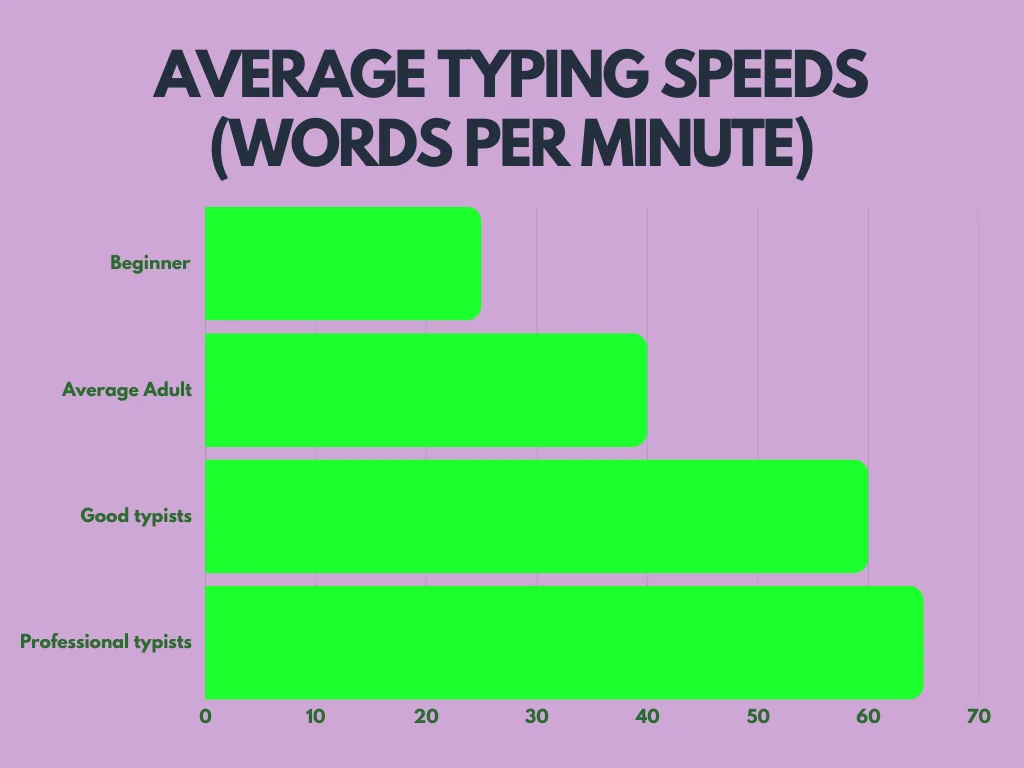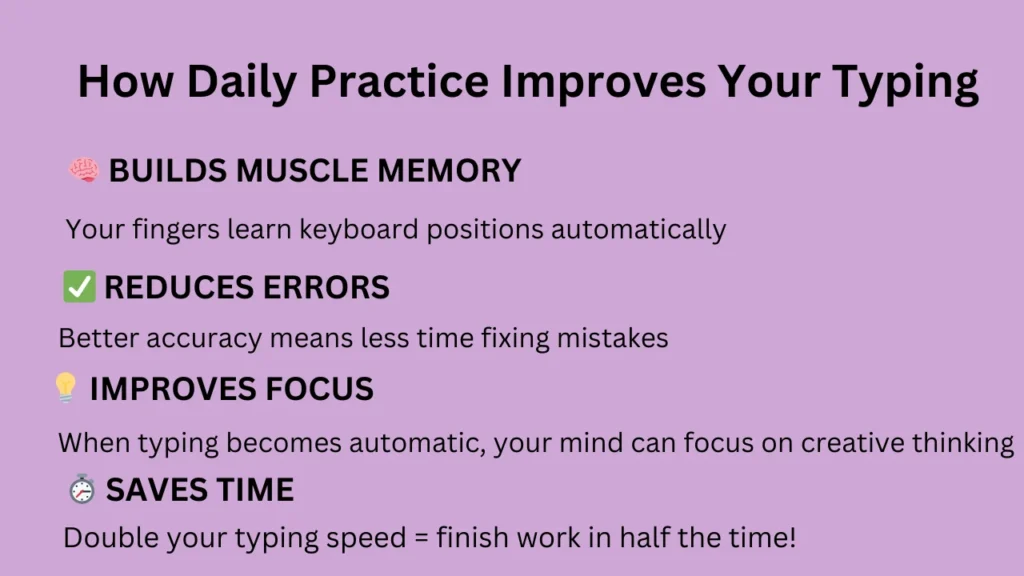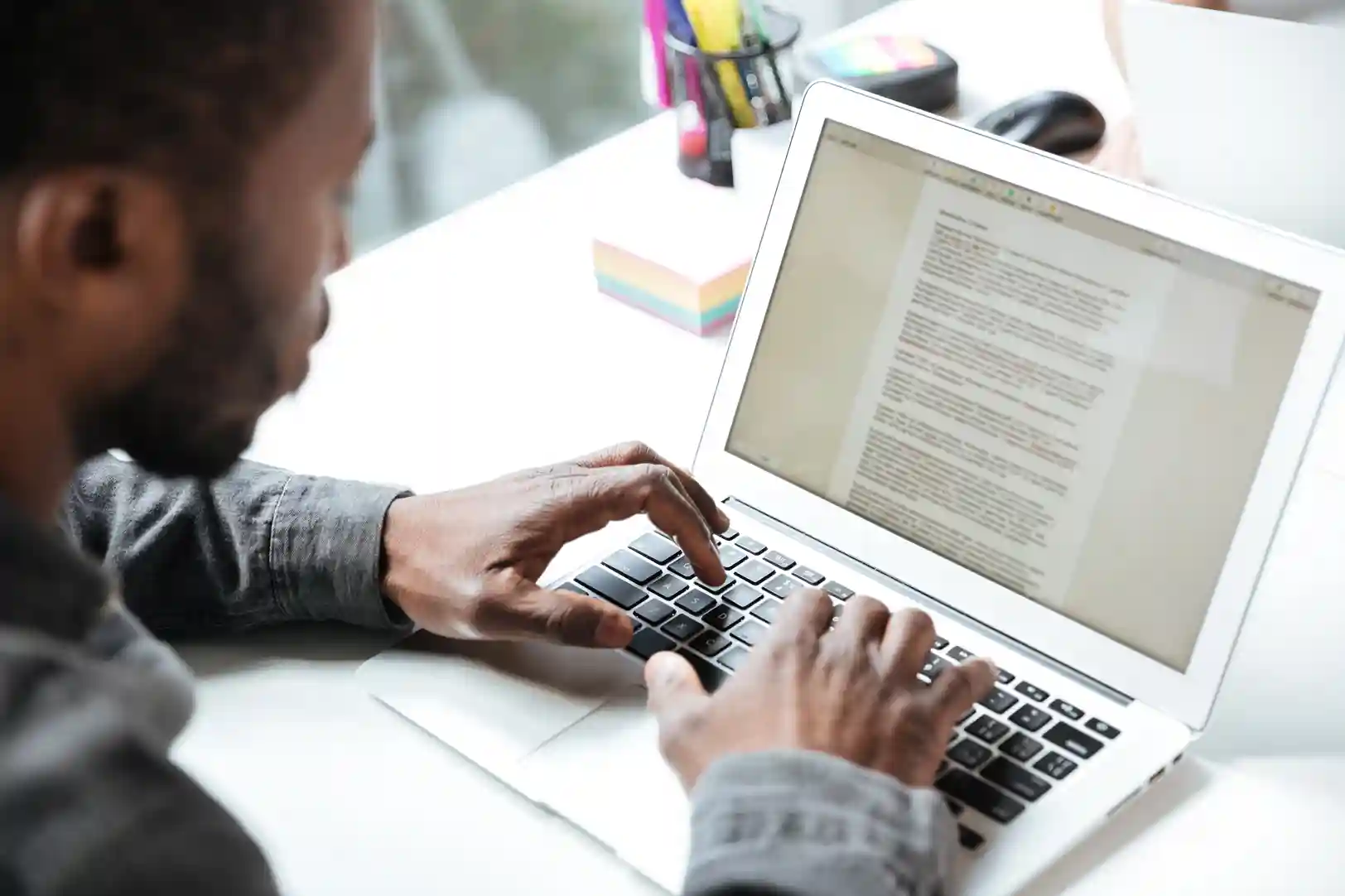Have you ever watched someone type super fast without looking at the keyboard? These typing skills can help people get better jobs and be more successful. Let’s learn how practicing typing every day can help you in the future!
What is Typing Practice?
Typing practice means spending time getting better at using a computer keyboard. When you practice typing:
- Your fingers learn where all the letters are
- You can type faster without making mistakes
- You don’t need to look at the keyboard
- Your brain and hands work together better
Using fun tools like an alphabet typer game makes practice feel more like playing a game than doing work!
Why Typing Matters in Today’s World
In the past, people wrote most things by hand. Now, almost everything happens on computers, phones, and tablets. The average worker types more than 4.3 million words every year! That’s like typing 50 long books!
Nearly every job today needs some typing skills. Doctors type patient notes. Teachers type lesson plans. Store workers type inventory lists. Even jobs that don’t seem computer-focused often need typing skills.
How Fast Do People Type?
Words per minute (WPM) is the standard unit used to measure typing speed. This tells us how many words a person can type in one minute.
- Beginners: 10-25 WPM
- Average people: 30-40 WPM
- Good typists: 40-60 WPM
- Professional typists: 65+ WPM (anything above 80 WPM is considered advanced typing)
When you first start learning to type, you might be slow. But with daily practice, you can improve quickly!

Touch-Typing: The Professional Way to Type
There are two main ways people type:
- Hunt-and-peck typing: A method where the typist looks at the keyboard and types using only a few fingers.
- Touch-typing: A technique that involves using all ten fingers to type without needing to look at the keyboard.
Touch-typing is much faster and helps you make fewer mistakes. Touch-typing is preferred by professional typists as it enables them to:
- Type without looking down
- Use all ten fingers efficiently
- Think about what they’re writing instead of where the keys are
- Work for longer without getting tired
How Daily Practice Improves Your Typing
Just like learning to play a sport or a musical instrument, typing gets better with practice. Here’s what happens when you practice typing every day:
1. Your Brain Makes Connections
When you first start typing, your brain has to think hard about where each key is. After practice, your fingers seem to know where to go all by themselves! This is called muscle memory.
2. Your Speed Increases
The more you type, the faster you’ll get. Many people can double their typing speed with regular practice. Imagine completing your homework in just half the time!
3. You Make Fewer Mistakes
Practice helps you hit the right keys more often. This means less time fixing errors and work that looks neater and more professional.
4. You Can Focus on Ideas
When you don’t have to think about where your fingers go, your brain is free to focus on what you’re trying to say. It enables you to create stronger stories, essays, and reports.

Why Employers Want Fast Typists
Companies like to hire people who type well because:
1. Fast Typists Get More Work Done
By doubling your typing speed, you can accomplish twice the work in the same time frame. This makes companies happy because they get more work finished each day.
2. Good Typists Make Fewer Mistakes
Employers want people who type without errors because it leads to “improved customer service, better accuracy, and a reduction in training costs.” Fewer mistakes means better work!
3. Typing Skills Show You’re Tech-Smart
When you can type well, it shows employers that you understand technology and can learn other computer skills quickly.
4. You Can Handle More Job Tasks
If you type quickly, you can handle emails, reports, and other typing tasks without falling behind on your other work.
Jobs That Really Need Good Typing Skills
Almost all jobs need some typing, but these jobs especially need fast, accurate typing:
1. Office Jobs
Office workers spend much of their day typing:
- Emails to coworkers and customers
- Reports and documents
- Notes from meetings
- Information in databases
2. Customer Service Representatives
These workers help customers through:
- Live chat support
- Answering emails
- Writing up solutions to problems
- Entering customer information
3. Writers and Editors
People who write for a living must type quickly to:
- Create articles, books, and blogs
- Edit other people’s writing
- Meet deadlines for their work
- Send ideas and updates to their team
4. Computer Programmers
Coders need perfect typing because:
- One wrong letter can break the whole program
- They type special symbols and code all day
- Fast typing means they can create more programs
- They often work on tight deadlines
5. Medical Workers
Medical transcriptionists type recordings for doctors and need to understand special medical words. Nurses and doctors also type patient records and must be accurate.
6. Legal Professionals
Workers in legal departments or law offices spend almost two-thirds of their workweek typing, averaging over 60 WPM. They type legal documents, court papers, and letters that must be perfect.
How Better Typing Leads to More Money
Better typing skills can help you earn more money in several ways:
1. Access to Better Jobs
According to the US Bureau of Labor Statistics, millions of new jobs requiring typing skills have been created in recent years. Many of these are higher-paying positions like executive assistant or legal secretary.
2. Faster Promotions
When your boss sees how quickly and accurately you work, you might get promoted faster than coworkers who type slowly.
3. Higher-Paying Careers
Studies show that workers who earn $100,000 or more per year spend over 87% of their workweek typing! Learning to type well can help you get these high-paying jobs.
4. More Work in Less Time
If you work in a job that pays by the project instead of by the hour, typing faster means you can do more projects and earn more money.
Health Benefits of Good Typing Skills
Typing the right way doesn’t just help your career—it helps your body too!
1. Better Posture
Learning proper typing techniques also teaches you about good posture. Sitting correctly while typing helps prevent neck stiffness and wrist pain.
2. Less Eye Strain
When you’re not constantly shifting your focus between the screen and keyboard, your eyes experience less strain.
3. Reduced Risk of Injuries
By learning how to type fast and accurately, you can significantly lower occupational health concerns like poor posture and RSI (repetitive strain injury).
4. Less Mental Stress
When typing is easy for you, you don’t feel stressed about finishing your work on time.
How to Improve Your Typing Skills
Ready to become a better typist? Here’s how to start:
1. Use the Right Finger Position
Place your fingers on the “home row” keys:
- Left hand: A, S, D, F
- Right hand: J, K, L, ;
Your thumbs rest on the space bar. Each finger is responsible for certain keys above and below the home row.
2. Practice with Fun Games
Use typing games and tools that make practice fun:
- Alphabet typer games that challenge you to type faster
- Games where you race against others or the clock
- Programs that track your progress so you can see improvement
3. Set a Regular Practice Schedule
Just 15 minutes a day can lead to significant improvement! Try to practice:
- At the same time each day
- Before starting homework
- During computer time at school
- On weekends when you have extra time
4. Track Your Progress
Use typing tools that show your statistics so you can see how you’re improving. Watching your speed and accuracy get better is very motivating!
5. Focus on Accuracy First
Don’t worry about being super fast right away. It’s better to type slowly and correctly than to rush and make lots of mistakes. Speed will come naturally as you practice.
Real-World Benefits for Students
Even though you’re still in school, accurate typing skills can help you now:
1. Faster Homework Completion
When you type quickly, you can finish typing assignments in less time, leaving more time for fun!
2. Better-Looking Work
Teachers appreciate neat, error-free typing. This can help you get better grades on reports and essays.
3. More Computer Confidence
Being good at typing makes you feel more comfortable using computers for all kinds of tasks.
4. Preparation for Higher Grades
Middle school and high school require more typing. Starting to practice now gives you an advantage later.
Success Stories: How Typing Changed Lives
Many successful people started by learning to type well:
- Sarah: Started practicing typing in elementary school. By high school, she could type 90 WPM and got a part-time job as a virtual assistant, earning money while still a student.
- Marcus: Loved video games but also practiced typing 20 minutes daily. His fast typing helped him become a popular game reviewer and later a professional programmer.
- Leila: Used typing games to improve from 15 WPM to 75 WPM over two years. She now works from home as a transcriptionist while attending college.
Start Your Typing Journey Today
You don’t need fancy equipment to start improving your typing skills. All you need is:
- A computer or tablet with a keyboard
- A typing program or website (many are free!)
- A few minutes each day to practice
The digital marketplace is growing bigger every day. Learning to touch type will make you more appealing to employers. Starting now gives you plenty of time to become an expert typer by the time you’re looking for a job!
Conclusion
Your fingers can be powerful tools for your future success! By practicing typing every day, you’re building a skill that will help you throughout school and into your adult working life.
Remember, everyone starts as a beginner. The important thing is to practice regularly and watch yourself improve. Your future self will thank you for the time you spend now learning this important skill!
Think about it: just 15 minutes of typing practice each day could lead to better grades now and better job opportunities later. That’s a small investment for such a big reward!
So open up an alphabet typing game, put your fingers on the home row, and start your journey to typing success today!


